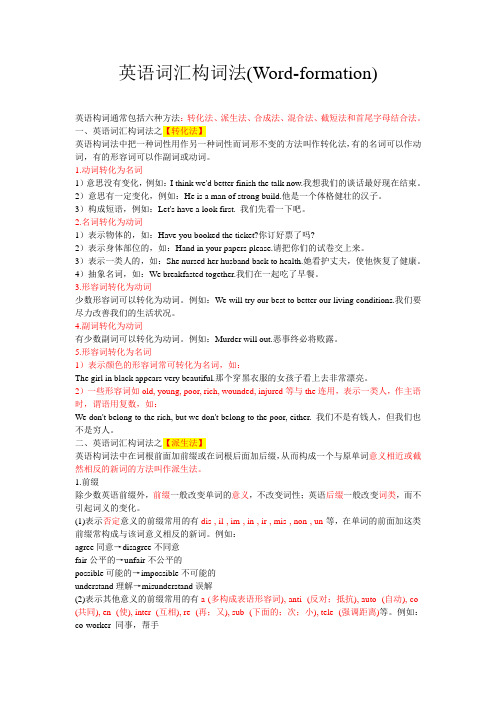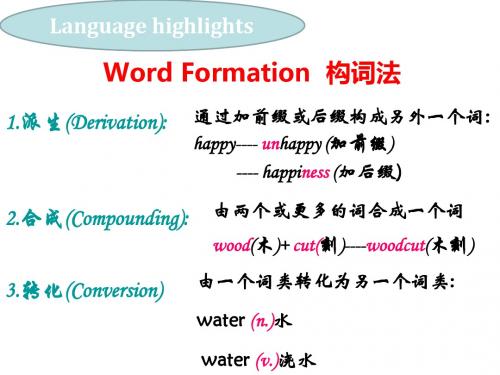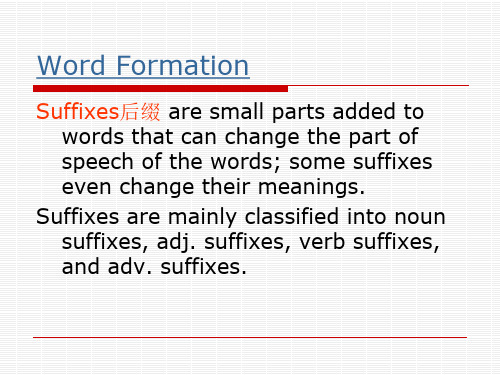6. Word Formation
- 格式:ppt
- 大小:85.50 KB
- 文档页数:3



单词的形成方式单词的形成方式有以下几种:1. 构词法(derivation/word formation):通过添加前缀、后缀、词缀或派生词来改变词的意义和词类。
例如,添加前缀 "un-"可以将形容词变为相反意义的词,如 "happy"(快乐的)变为"unhappy"(不快乐的)。
2. 合成法(compounding):通过将两个或多个词组合成一个新的词。
例如,"black"(黑色的)和 "board"(板)组合成"blackboard"(黑板)。
3. 转化法(conversion):通过改变词的词类而不改变词的形式。
例如,"cook"(动词,烹饪)可以转化为 "cook"(名词,厨师)。
4. 缩略法(abbreviation):通过缩短单词或词组来形成简化的词。
例如,"information"(信息)可以缩写为 "info"。
5. 借词法(borrowing):从其他语言中引入新词。
例如,英语中借用了许多法语、拉丁语、希腊语和其他语言的词和短语。
6. 高频率使用词法(back formation):通过从一个较复杂的词中移除看似是后缀的部分来形成一个新的词。
例如,"editor"(编辑者)被认为是从 "edit"(编辑)中移除了后缀 "-or" 形成的。
除了上述方式外,还有一些其他形成单词的方式,如吸收外来词(loanwords)、混合词(blending)、模仿声音词(onomatopoeia)等。
单词的形成方式的多样性使得语言能够不断发展和适应社会的需求。






构词法(Wordformation)构词法(Word Formation)三种主要的英语构词法:合成、转化和派生,其中用得最多的是“派生”。
I. 合成 (Compounding)1. 合成名词的构词法1) n. + n.cowboy craftsman fantasyland(幻境) newspapernightfall salesman snowstorm steamboat2) adj. + n.backbone(脊椎) blackboard broadcast darkroom greenhouse shorthand(速记)wildlife3) v-ing + n.dining-room sitting-room sleeping-pills reading-room4) v. + n.playground postcard pickpocket(扒手)5) n. + v-inghandwriting sightseeing sunbathing6) v. + adv./prep.break-through get-together cut-in go-between(中介)7) adv./prep. + n.afternoon downfall income outbreak(爆发)by-product(副产品)8) 其他grown-up passer-by well-being(福利) outgoing(郊游)2. 合成形容词的构词法1) n. + v-edhandmade man-made sunburnt state-run2) n. + v-ingEnglish-speaking peace-loving3) n. + adj.snow-white world-famous worldwide duty-free(免税的)4) adj./num. + n-edcold-blooded good-tempered(脾气好的) noble-mined warm-hearted three-legged5) adj./adv. + v-ingeasy-going funny-looking outgoing(开朗的)hard-working far-reaching(深远的)6) adj./adv. + v-ednew-born ready-made newly-built well-known7) 其evergreen face-to-face worn-out up-to-date part-time full-time3. 合成动词的构词法1) adv. + v.overthrow overwork underline uphold(支持)2) adj. + n.blacklist(列黑名单) whitewash(粉刷)3) n. + v.sleep-walk(梦游) sunbathe typewriteII. 转化 (Conversion)1) v. – n. / n. – v.break v. 打破– break n. 休息taste v. 品尝– taste n. 味道sleep v. 睡觉– sleep n. 睡眠hand n. 手 -- hand v. (递)交step n. 脚步– step v. 走;踏【注意】以下的名词与动词的读音有所不同:present n. 礼物– present v. 赠送use n. 用途– use v. 使用increase n. 增加– increase v. 增加export n. 出口– export v. 出口import n. 进口– import v. 进口transport n. 运输– transport v. 运输2) adj. – v. (-- n.)clean adj. 清洁的– clean v. 打扫clear adj. 清楚的– clear v. 清除close adj. 近的;亲密的– close v. 关闭own adj. 自己的– own v. 拥有– own n. & pron. 自己(的东西) waste adj. 废弃的– waste v. 浪费– waste n. 废物3) adj. – n./adv.back adj. 后面的– back n. 后面;背部front adj. 前面的– front n. 前面;前线left adj. 左(边)的– left n. 左(边)deep adj. 深的– deep adv. 深hard adj. 硬的;艰苦的– hard adv. 努力;艰苦地III. 派生 (Derivation)1. 前缀 (Prefix)a) 表示否定的前缀1) dis- (+ v.) 不agree – disagree appear – disappearcover – discover like – dislike2) un- (+ adj./v.) 不able – unable fair – unfairlimited – unlimited known – unknowndo – undo 解开 tie – untie 解开3) in-/ im-/ il-/ ir- (+ adj./n.) 不/无active – inactive capable – incapable(无能的) correct – incorrect complete – incomplete balance – imbalance n. mature – immature(不成熟的) patient – impatient adj. possible – impossible legal – illegal logical – illogicalregular – irregular religious – irreligious(无宗教的) 4) non- (+ n./ adj.) 不/无/非smoker – non-smoker stop – non-stopviolence – non-violence violent – non-violentb) 其他1) mis- (+ v.) 错误地lead – mislead understand – misunderstandapply – misapply address – misaddress(寄错信件) 2) re- (+ v.) 重;再consider – reconsider cycle – recyclestudy – restudy use – reuseview – review write – rewrite3) en- (+ adj.) 使(能) …able – enable danger – endangerlarge – enlarge rich – enrich4) multi- (+ adj./n.) 多…cultural – multicultural channel – multichannel5) tele- (+ n.) 长途的/远程的phone – telephone scope – telescope(望远镜)vision – television communication – telecommunication(电讯) 6) kilo- (+ n.) 千的gram – kilogram meter – kilometer7) anti- (+ n.) 反/抗/防…的aircraft – antiaircraft(防空的) caner – anticancer(抗癌的)8) bi- /tri- (+n./ adj.) 双/三...的cycle – bicycle weekly – biweekly(双周的)angle – triangle athlete – triathlete(三项全能运动员)9) fore- (+ n./v.) 前的/先的head – forehead leg – forelegcast – forecast see – foresee10) pre- (+ n./v./ adj.) 预先的face – preface(前言/序) arrange – prearrangebuilt – prebuilt11) post- (+ n.) 后的war – post-war liberation – post-liberation12) inter- (+ adj./v./n.) 之间的/交互的American – inter-American national – internationalact – interact(互相作用) connect – interconnect(互相连接) 13) co- (+ v./n.) 联合/共同operate – cooperate(合作) star – co-star(联合主演)worker – co-worker14) sub- (+ n./v.) 下面的/次的/副的way – subway heading – subheading(副标题)edit – sub-edit(担任助理编辑)15) super- (+ n.) 超级的man – superman market – supermarket16) auto- (+ n.) 自动的/自己的mobile – automobile(汽车)graph – autograph(亲笔签名;手稿)2. 后缀 (Suffix)a) 加后缀变成的名词可表示人或仪器等1) -er/ -or/ -ee/ -ess (v./n. + ~)teach – teacher village – villagertranslate – translator interpret – interpreter(口译员) act – actor employ – employer – employeeact – actress wait – waitresscalculate – calculator erase –eraser2) -ese/ -an/ -ian/ -ish/ -ist/ -ant (n. + ~)China – Chinese Japan – Japanesemusic – musician library – librarianIndia – Indian America – AmericanBritain – British Spain – Spanishphysics – physicist social – socialistassist – assistant account -- accountantb) 加后缀变成的名词可表示行为、动作、性质、状态等1) -ance/ -ence/ -cy (adj. + ~) 表性质或状态important – importance independent – independence agent – agency2) -ment/ -tion/ -ation/ -sion (v. + ~) 表示行为或动作move – movement act – actiondecide – decision conclude – conclusioneducate – education pronounce – pronunciation3) -ness/ -ship (adj./n. + ~) 表示性质、状态、关系或身份sad – sadness sick – sicknesshard – hardship friend – friendshipcitizen – citizenship4) -ty/ -ety/ -ity (adj. + ~) 表示性质或状态safe – safety anxious – anxietyable -- ability responsible – responsibilitycurious – curiosity various – variety5) -ism (adj. + ~)主义social – socialism material – materialism(唯物主义) 6) -ing (v. + ~) 表示行为或动作act – acting feel – feeling build – building7) -dom/ -th (adj./n. + ~)表示性质或状态free – freedom wise – wisdom king – kingdomdead – death true – truth warm – warmth8) -hood/-hold (n. + ~) 表示时期、身份或关系boy – boyhood girl – girlhood child -- childhood brother – brotherhood mother – motherhood house – household(一家人;家族)9) -ful (n. + ~) 满满一…hand – handful(一把) house – houseful(满屋)mouth – mouthful plate – plateful(满盘)c) 构成形容词的后缀有1) -able/ -ible (v./n. + ~) 可以accept – acceptable respect – respectable response – responsible(负责的;可依靠的)2) -al/ -ful (n./v. + ~) 有…(性质)的/culture – cultural nation – nationalcare – careful forget – forgetful3) -less (n. + ~) 无care – careless hope – hopeless use – useless4) -ish (n. + ~) 有…(性质)的/像…的child – childish fool – foolish woman – womanish5) –ive/ -ous (n./v. + ~) 有…(性质)的act – active create – creative effect – effective(有效的) fame – famous humour – humorous6) -en/ -ent/ -y/ -ly (n./v./adj. + ~) …做的/能…的/是…的gold – golden wood – woodendepend – dependent patience – patientsalt – salty thirst – thirstyfriend – friendly lone – lonelyday – daily month – monthlyd) 构成动词的后缀有1) -fy/ -ify/ -ize/ -ise (adj./n. + ~) 使…化beauty – beautify simple – simplify apology – apologize memory – memorize real – realize modern – modernize 2) -en (adj./n. + ~) 使… 变为deep – deepen length – lengthenshort – shorten strength – strengthene) 构成副词的后缀有1) -ly (adj. + ~) … 地bad – badly lucky – luckily sweet – sweetlygentle – gently loud – loudly weak – weakly2) -ward(s) (n./prep./adv. + ~) 朝/向…back – backward(s) for – forward(s)down – downward(s) south – southward(s)。

英语词汇构词法(Word-formation)英语构词通常包括六种方法:转化法、派生法、合成法、混合法、截短法和首尾字母结合法。
一、英语词汇构词法之【转化法】英语构词法中把一种词性用作另一种词性而词形不变的方法叫作转化法,有的名词可以作动词,有的形容词可以作副词或动词。
1.动词转化为名词1)意思没有变化,例如:I think we'd better finish the talk now.我想我们的谈话最好现在结束。
2)意思有一定变化,例如:He is a man of strong build.他是一个体格健壮的汉子。
3)构成短语,例如:Let's have a look first. 我们先看一下吧。
2.名词转化为动词1)表示物体的,如:Have you booked the ticket?你订好票了吗?2)表示身体部位的,如:Hand in your papers please.请把你们的试卷交上来。
3)表示一类人的,如:She nursed her husband back to health.她看护丈夫,使他恢复了健康。
4)抽象名词,如:We breakfasted together.我们在一起吃了早餐。
3.形容词转化为动词少数形容词可以转化为动词。
例如:We will try our best to better our living conditions.我们要尽力改善我们的生活状况。
4.副词转化为动词有少数副词可以转化为动词。
例如:Murder will out.恶事终必将败露。
5.形容词转化为名词1)表示颜色的形容词常可转化为名词,如:The girl in black appears very beautiful.那个穿黑衣服的女孩子看上去非常漂亮。
2)一些形容词如old, young, poor, rich, wounded, injured等与the连用,表示一类人,作主语时,谓语用复数,如:We don't belong to the rich, but we don't belong to the poor, either. 我们不是有钱人,但我们也不是穷人。

Word Formation:词汇构成详解Word formation is the process of constructing words from their constituent parts. It involves both the creation and alteration of existing words, which are known as morphological operations. Word formation includes the use of prefixes, suffixes, infixes, compounding, reduplication and more.Prefixes are word elements added to the beginning of a word that modify its meaning. They come from other languages, such as Latin and Greek, and have been adapted into English. Examples of common prefixes include “un-” (not), “dis-” (opposite or reverse), and “re-” (again).Suffixes are word elements added to the end of a word that modify its meaning. Examples of common suffixes in English include "-ing" (present participle), "-ed" (past tense), and "-ize" (to make).Infixes are word elements that are added within a word, usually to modify its meaning. In English, there are few true infixes; most examples are truncated versions of words, such as the informal past tense form "-ed" ("I walk-ed").Compounding is the process of combining two or more words to create a new, single word. Examples of compound words in English include "sunflower," "sunlight," and "sunshine." Reduplication is a type of word formation that involves either repeating part or all of a word. Reduplication can be used to convey emphasis or to add a humorous effect. Examples of reduplication in English include "pitter-patter" and "fancy-shmancy."Blending is another type of word formation in which two words are combined to create a new one. Commonly used blends include "chillax" (chill+relax) and "bromance" (brother+romance).Clipping is a type of word formation in which part of a word is removed. This is done to create a shorter version of the word, often for convenience or to reduce ambiguity. Examples of clipped words used in English include "fridge" (refrigerator) and "fax" (facsimile).Back-formation is a process of word formation in which a “new” word is created by removing a suffix from an existing word. Often the resulting word has a different meaning than the original. Examples of back-formation in English include "edit" (from editor) and "burgle" (from burglar).Conversion is a type of word formation in which a word changes its part of speech without any changes to its spelling or pronunciation. It involves taking a verb or noun and turning it into an adjective or adverb. Examples of conversion in English include "careless" (from "to care"), "homely" (from "home"), and "slowly" (from "slow").Word formation is an important part of language, as it allows us to expand our vocabulary and communicate more effectively. By understanding the various processes involved in word formation, we can communicate more accurately and clearly.。




英语构词法wordformation一、英语的词汇一个人的“词汇量”可以分成四个层次,掌握的数量依次递增:能说的词汇(peakingvocabulary)、能写的词汇(writingvocabulary)、能读的词汇(readingvocabulary)、能猜的词汇(guevocabulary)。
前两个层次属于能够应用的积极词汇(activevocabulary),后两个层次属于不一定能够应用的词汇(paivevocabulary)。
二、英语单词的结构英语的“词汇”(vocabulary或le某icon)适应于所有单词(word)的总称。
词的定义:词是能独立运用的、最小的、有语义的语言单位。
就其句法功能来说,词可以分为功能词(functionword)和实义词(contentword)两类。
功能词指的是没有完整词汇意义或语法功能的词,包括限定词(determiner)、代词(pronoun)、介词(prepoition)、连接词(conjunction)、助动词(au某iliaryverb)、感叹词(interjection)等。
实义词指的是本身有完整词汇意义的词,包括名词(noun)、动词(verb)、形容词(adjective)、副词(adverb)等。
英语单词是由字母拼写而成的,可以由一个字母组成一个单词,例如:I(pron.我);也可以由45个字母组成一个单词,例如:pneumonoultramicrocopicilicovolcanoconioi(n.肺尘病)。
英语单词的内部结构更是不尽相同。
让我们先来分析以下这三组词:1.book,book,bookih,bookcae.第二组例词都可以被分析成更小的有意义的单位:toler+ate,toler+ance,toler+ant,toler+ation,toler+able,in+toler+a ble。
toler-的语义从这些例词中已经体现出来:“忍受、容忍”;-ate 往往用来构成动词,表示“成为”,如negate,evaporate,agitate;-ance用来构成名词,表示“性质”“状况”、等意思,如vigilance,arrogance,defiance;-ant可以用来构成形容词,表示“的“意思,如vigilant,arrogant,defiant;-ation用来构成名词,表示“动作”、“状态”、“结果”,如education,dictation,organization,foundation;-able经常用来构成形容词,表示“可的”,如eatable,acceptable,variable;in-往往用在词的前面,表示否定的意义,如incapable,inaccurate,infirm。


构词法概述语言的基本要素之一是词汇。
在语言发展的最初阶段,人们使用的是少量而简单的词汇,这些词汇只表示日常简单的事物和概念,构成语言中最基本的词,称之为原生词,也叫基本词或词根。
英语里的原生词大都是单音节的,例如:sun, man, head, foot, fish, see, run等,其数量有限。
随着社会的发展与进步,语言的扩充与融合使语言变得复杂,原有的有限的原生词已不够用,人们便创造了一些新词来表示新生的事物和概念。
按照一定的语言规则创造新词的方法,称之为构词法(word-formation or word-building)。
一、英语主要有三种构词法1. 转化(Conversion):不用借助构词词缀,把一个单词从一种此类转化成另一种词类。
由于词类转化的结构,英语中就形成了大量外形相同但词类不同的词,即同形异类词water水n. →water浇水v. film 电影n.→film 拍电影v.2. 派生(Derivation):通过加前缀和后缀构成另一个词happy→unhappy 加前缀→happiness 加后缀3. 合成(Compounding):由两个或更多词构成一个词black黑的+board板→blackboard黑板happy + go + lucky→happy-go-lucky无忧无虑的pick摘,挖+ pocket口袋→pickpocket 扒手二、英语还有一些次要构词法1. 截短法(Clipping):把一个词的一部分去掉,构成一个新词bicycle→cycle2. 混合(Blending):把两个词各取一部分,混合成一个新词motor + hotel→motel汽车旅馆3. 缩写(Abbreviation):把几个词的首字母连在一起International Monetary Fund→IMF国际货币基金组织4. 反转构词法(Backformation):把带词尾的名词去掉词尾构成动词editor (n.)→edit(v.)三、构词法的运用要学好英语,掌握构词法直观重要。

Word formation(构词法)㈠. Affixation(词缀法)词缀法(Affixation)在一个单词前面或后面加一个词缀(affix)而构成一个新词的方法叫词缀法。
构成的词叫派生词(derivation)。
词缀分两种:前缀(prefix)和后缀(suffix)。
加在单词前面的叫前缀,通常改变或添加该单词的含义;加在单词后面的叫后缀,通常改变该单词的词性。
下面列出常用的前缀和后缀。
1.常用前缀1). 表示否定的前缀:un-(不,反动作),加在形容词和分词上表示“不”,加在动词上表示“反动作”,如:unwise(不明智的)unforgiving(不宽恕的,不容忍的)unexpected(想不到的)untie(解开)in-(不),(在l 前加il-, 在m, b, p 前加im-, 在r 前加ir-),加在形容词和名词上,如:informal(非正式的)impolite(不礼貌的)illegal(非法的)irregular(不规则的)non-(不,非),加在名词和形容词上,如:non-smoker(不吸烟者)nonsense (胡言乱语)nonviolent(非暴力的)nonstop(直达的,中途不停的)dis-(不,取消,除去),加在形容词、名词、动词上,如:dishonest(不诚实的)disagree(不同意,不一致)disobey(不服从)dislike(不喜欢)disorder(混乱)disarm(解除武装,裁减军备)anti-(反对,抵抗),加在名词、形容词上,如:antisocial(反社会的)antibody(抗体)antifreeze(防冻剂)antinuclear(反对使用核武器)counter-(反),加在动词、名词上,如:counteract(抵制)counterrevolution(反革命)mis-(错误,不好),加在动词、名词、分词上,如:mismatch(不般配)misconduct(行为不正)misunderstand(误解)mislead(引入歧途)mal-(坏,不当),加在动词、名词、分词上,如:maltreat(虐待)malformed(畸形的)malnutrition(营养不良)malfunction(失灵)2). 表示程度、大小等的前缀:co-(合作,共同),加在名词、动词上,如:cooperate(合作)co-exist(共存)co-education(男女同校)co-heir(共同继承人)super-(超级,超过),加在名词、形容词上,如:supermarket(超级市场)superman(超人)supernatural (超自然的)supersensitive(过于敏感的)sur-(过量,外加),加在名词、动词上,如:surcharge(超载)surtax([征收]附加税)ultra-(极端,超过),加在形容词、名词上,如:ultra-conservative(极端保守的)ultra-leftist(极左分子)over-(过度,超过),加在动词、形容词、名词上,如:overeat(暴食)overestimate(估计过高)overconfident(自负的)overweight(超重)under-(低于,少于),加在动词、过去分词上,如:underestimate(过低估计)undercharge(少算价钱)underprovided(供给不足的)underdeveloped(欠发达的)micro-(微小),加在名词上,如:micro-computer(微电脑)microscope(显微镜)microfilm(缩微胶卷)microphone(麦克风)mini- (小),加在名词上,如:minibus(小公共汽车)mini-skirt(超短裙)3). 表示位置的前缀:fore-(先,前),加在名词上,如:forearm(前臂)foreleg(前腿)foresail(前桅帆)forename(教名,(在姓之前的)名)inter- (间,际,相互),加在形容词、动词、名词上,如:international (国际的)interdependent(互相依赖的)interview(会见)intermarry (intermarriage)(近亲通婚)sub-(在…下,次,再),加在名词、动词、形容词上,如:subway(地铁)subtitle(副标题)sublet (转租)subdivide(再分)subtropical(亚热带的)subnormal(低能的)super-(在上),加在名词上,如:superstructure(上层建筑)superscript(写在右上角的)trans-(横过,转移),加在形容词、动词上,如:transatlantic(横渡大西洋的)transplant(移植)4). 表示时间和顺序的前缀:ex-(前),加在名词上(ex 后要用连字号),如:ex-president(前总统)ex-serviceman(退役军人)ex-husband(前夫)ex-wife(前妻)fore-(预先),加在动词、名词上,如:foretell(预言)forewarn(预先警告)foreshadow(预兆)foreknowledge(预知)pre-(在前,事先),加在名词、形容词、动词上,如:pre-war(战前)pre-school(学前)prehistoric(史前的)premature(早熟的,早产的)pre-heat(预热)pre-cook(在烹饪之前)post-(在后),加在名词、形容词上,如:post-war(战后)post-election(大选后)posthumous (死后的)postgraduate (研究生,大学毕业后所进行的)mid-(中间),加在名词上,如:midnight(午夜)midsummer(仲夏)re-(再),加在动词、名词上,如:rebuild(重建)recycle(再循环)reappearance(再现)reanalysis(重新分析)5). 表示数量的前缀:semi-, hemi-(半),如:semicircle(半圆)semiconductor(半导体)semi-feudal(半封建的)semimonthly(每半月一次的)hemisphere(半球)hemicycle(半圆)uni-, mono- (一,单),如:unicycle(独轮车)uniform(制服)monoxide(一氧化物)monologue(独白)monotonous(单调的)monosyllabic(单音节的)bi-, di- (二),如:bicycle(自行车)bilateral(双边的)bilingual(两国语言的)dioxide(二氧化物)diatomic(二原子的)tri- (三),如:tricycle(三轮车)triangle(三角形)multi- (多),如:multimedia(多媒体)multilingual (多语言的)multi-lateral(多边的)multi-colored(多种颜色的)deci-(十分之一),centi-(百分之一),milli-(千分之一),kilo-(千),如:decigram(分克,十分之一克)decimeter(分米,十分之一米)centigram(公毫,百分之一克)centimeter (工分,厘米,百分之一米)milligram(毫克,千分之一克)millimeter(毫米,千分之一米)kilogram (公斤,千克)kilometer (公里,千米)6). 来源于希腊、拉丁语的前缀:auto-(自动,自己),加在名词、形容词上,如:automation(自动化)automatic (自动的)autonomy(自治权)autonomous(有自治权的)autobiography(自传)autograph(亲笔,签名)tele-(远),加在名词上,如:telescope(望远镜)telegram(电报)telephone(电话)television(电视)vice- (副),加在名词上,如:vice-chairman(副主席)vice-president(副总统)7). 转化词类的前缀:en-, em-(加在b, p 音前),(放入,供给,使成为),加在名词、形容词上构成动词,如:enclose(围起)endanger (危及)enrich(使丰裕)enable (使能够)encourage(鼓励)empower(授权)embed(嵌入)be-(使成为),加在名词、形容词、不及物动词上,使之变为及物动词,如:befriend(友好对待)befog(云雾笼罩)belittle(轻视)befoul(弄脏,污染)befall(使降临,发生)benumb(冻僵,失去感觉)3. 常用后缀1). 名词后缀a. 表示个体名词的后缀:-er 如:teacher, worker, Londoner, southerner(南方人)-or 如:actor, visitor instructor-ee 如:addressee(收信人), refugee(难民), employee (雇员)-eer 如:engineer, mountaineer(登山运动员)-ant 如:assistant, inhabitant(居民)-ist 如:typist, communist, leftist(左翼的人)-ian, -an 如:musician, physician, republican(共和主义者)-ess(表示阴性),如:actress, waitress, lioness, tigressb. 表示抽象名词的后缀:-ness 如:carefulness, happiness, goodness-ment 如:argument, movement, punishment-ure 如:failure, pressure, departure-ing 如:feeling, building, opening-al 如:arrival, refusal, approval-age 如:marriage, shortage, baggage-ism 如:communism, socialism, heroism(英雄主义)-ship 如:friendship, leadership, hardship-dom 如:freedom, wisdom, kingdom-hood 如:childhood, neighborhood, boyhood(少年)-(i)ty 如:activity, equality, safety-y 如:honesty, difficulty, discovery, delivery-th 如:truth, warmth, death-(a)tion, -sion 如:action, modernization, discussion-ance, -ence 如:appearance, assistance, reference, difference2). 动词后缀-en 如:shorten, sharpen, lengthen-ify 如:beautify, purify, simplify-ize 如:realize, modernize3). 形容词后缀-able 如:comfortable, unbreakable, drinkable-al 如:natural, professional, original-ful 如:awful, beautiful, careful-ic, -ical 如:organic, Pacific, physical-less 如:stainless, careless, useless-ish 如:childish, bookish, foolish-y 如:snowy, sleepy, curly-ous 如:dangerous, famous, courageous-ive 如:active, collective, impressive-en 如:golden, wooden, earthen-ed 如:gifted, colored, cultured-like 如:manlike, womanlike, homelike4). 副词后缀-ly 如:slowly, quickly, heavily-ward(s) 如:backward(s), downward(s), eastward(s) ㈡. Conversion(转化法)一个单词由一种词类转用为另一种词类,这种构词方法叫转化法。